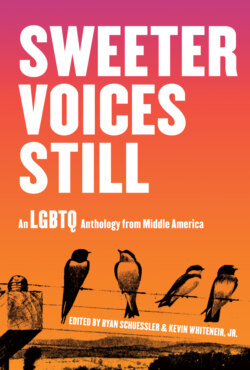Читать книгу Sweeter Voices Still - Группа авторов - Страница 7
На сайте Литреса книга снята с продажи.
ОглавлениеINTRODUCTION
RYAN SCHUESSLER AND KEVIN WHITENEIR, JR.
This book is about a place. A place home to innumerable stories. Some you know, recounted time and again around dinner tables and barstools, between raucous laughs and in hushed whispers. Others untold, or buried so deep they stir a familiar resonance you only recognize if you listen closely. Tales of family and friends; of love and hurt; of fear and joy in these places that we call home.
In recent years, much has been written about the Midwest and Appalachia. A lot of it was spent trying to map dark lines across the country’s gray areas; a vain attempt to establish where, exactly, they were at all. Being queer often gets talked about in a similar way: only when someone hubristically tries to define it do we see how blurry its borders actually are. Both have long struggled to be understood, or at least respected; their narratives have often been created by someone else. The ways we fight for Midwestern, Appalachian, and queer representation are quite similar, yet, too often, mutually exclusive. But here we are—Midwestern and Appalachian queers—existing in the middle in more ways than one. Taking this moment to tell our own stories.
The stories in this book come from as far east as Buffalo and as far west as the Bakken; as far North as the Upper Peninsula and as far south as Oklahoma. These are the homelands of Indigenous nations, so numerous we cannot name them all here. They remind us not only that this land was stolen—a history too often taken for granted—but that their lives encompass so much more than trauma. They remind us that they are here, and that many of them are queer, too, in ways and words beyond the LGBTQ acronym. We implore you: as you celebrate your stories and ideas of these places, honor and turn your eyes to theirs.
Both of us are from this place. Ryan grew up in Missouri before moving to Chicago as an adult. Kevin was born and raised on Chicago’s South Side before moving to very-rural Wisconsin for college. We come from very different communities—racially, economically, spiritually. But both of us identify somewhere within the expansive LGBTQ acronym and have never felt the need to leave this place because of that. On the contrary, it is why we envisioned this book.
The Midwest, Appalachia, Rust Belt, Great Plains, Upper South—Lower North?—whatever this place is called, is a queer place. It always has been. Its cities, farms, hamlets, reservations, suburbs, mountains, grasslands, forests, rivers, lakes, swamps, cul-du-sacs, dirt roads, and highways have birthed and shaped queer lives in all their beauty and mess. They are the backdrop to the existences we continue to fight for. Despite what American history might have you believe, this place is not a place from which queer people must always flee to find or save themselves. The queer people here do not exist only to serve as “blue dots” within “red states.” For every story about the kid from Iowa who steps off the bus in Manhattan, ready to “finally” live, is a story about the kid who was already living in Iowa. This book is about that kid and has been written by people like them.
Within this book’s pages you will find queer voices you might recognize: established and succesful writers and thinkers. You will also find voices you might not—people who don’t think of themselves as writers at all. You will find Black voices, immigrant voices, undocumented voices. You’ll find voices that have been scorned by a church, and voices from within a church; you’ll find Hindu, Muslim, and Jewish voices. You’ll find voices speaking in Spanish, Cherokee, Hmong, Somali, Ukrainian. You’ll find an unsigned letter from Amish Country. You will find stories that spread a kind of contagious glee. You will find stories dripping with a familiar pain, and yet whose voices are sweeter still. Sweeter all the same. You’ll find sex, love, and heartbreak and all the beings we meet along the way: trees, deer, cicadas, sturgeon.
You will find these truths within these pages: Transgender women and men are women and men, bisexual and aesexual people are real, “they” and “them” can be singular pronouns, Black lives matter, sex work is work, and you don’t have to go to a gay bar to be gay—and it’s okay if you do, too. In this book, we say “queer” a lot, but know that word means different things to different people and can be painful, especially for our elders. We see you, too.
Most importantly, though, we hope that people see themselves in this book’s pages. Every queer person’s life is punctuated by the moment when they first recognized someone like them in a movie, book, or TV show. For some, that has yet to even happen. Even if this book is not that moment, we hope it is in service to a future where that moment is so normal you don’t have to hope it will happen at all.
This book is for the kids from Missouri, the South Side, Lac du Flambeau, Amish Country, the Allegheny range, downstate, the U.P., the Sandhills, and so many other flown-over places, so that they might have an easier road.
